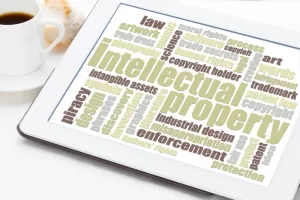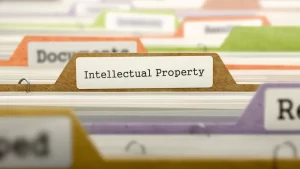a small firm that packs a big punch
- Home
- Attorneys
- Articles
- Practice Areas
- Family Law
- Criminal Defense
- Employment Law
- Personal Injury
- Workers’ Compensation
- Real Estate
- Wills, Trusts & Estates
- Blog
- Courts We Serve
- Contact
- Toggle website search
 The division of intellectual property in New Jersey divorce is often an involved and complex procedure. Intellectual property (IP) falls under the classification of non-tangible property, meaning that it does not have a physical presence and cannot be easily divided in the same way as tangible property, such as real estate or personal possessions.
The division of intellectual property in New Jersey divorce is often an involved and complex procedure. Intellectual property (IP) falls under the classification of non-tangible property, meaning that it does not have a physical presence and cannot be easily divided in the same way as tangible property, such as real estate or personal possessions.
One of the central intricacies in dividing IP in a divorce is determining the value of the property being examined while factoring in additional peripheral aspects and core elements of the marriage. IP can have significant value, but it can be a thorny process assigning an absolute monetary value to it, as its worth has the potential to evolve. Such issues make it particularly challenging for the court, whose responsibility is to determine and carry out an appropriate division of such an asset.
An additional complication of IP is that it can be one of many forms, as described in the subsequent section. Each variation of IP may have distinct rules and regulations governing its ownership and division in a divorce, making dividing IP even more cumbersome.
In some instances, controversies and disputes over who lays claim to IP and holds ownership in divorce may occur. For example, if one spouse contributed to the development of said IP during the marriage, they may allege ownership or assert rights to a share of the property. Legal conflicts and debates over IP ownership further complicate the dividing of assets and property, often prolonging divorce proceedings. Additionally, fighting over IP ownership can be a costly affair.
As illustrated above, dividing IP in a divorce can be draining and confusing due to the property’s non-tangible nature, the possibility of disputes arising over various factors, e.g., ownership and value, and the expenses of time, emotion, and legal costs. Regardless of which form of IP, you may consider it as yours and yours alone; however, your spouse may see and pursue it differently, as partially or entirely theirs. Outlined below are some of the most common forms of IP in divorces in New Jersey and key considerations if the intellectual property becomes a relevant issue in your divorce case. If you would like to speak with an experienced divorce lawyer about your rights and additional ways to protect and advocate for your interests in the process of divorcing, contact 973-233-4396 or complete our online intake form to help you. We serve clients in South Orange, Hoboken, Ridgewood, Clifton, Prospect Park, Wayne, Jersey City, Montclair, and nearby towns in Hudson, Bergen, Passaic, and Essex Counties.
As discussed above, in New Jersey, IP refers to intangible assets born of creative effort or other innovations. Examples of IP that may be relevant to NJ divorce include, but are not limited to:
IP can have significant value and be a crucial asset in a divorce. It is important for individuals going through divorce to seek to protect their rights and interests for any IP potentially involved.
In the state of New Jersey, the classification of IP for division purposes in a divorce will depend on the specific circumstances of the case and the nature of the property in question. Generally, IP is classified as either marital property or separate property. Marital property is effects acquired during the marriage and considered jointly owned by both spouses. A court will usually attempt to divide marital property equitably between the two spouses.
Alternatively, separate property indicates property acquired by one spouse before marriage, acquired via inheritance, or as a gift during the marriage. Separate or individual property is not subject to division in a divorce and remains the sole property of the spouse who owns it. IP acquired or developed during a marriage may be deemed marital property and subject to division in a divorce.
In contrast, if IP was developed or received before the marriage or received as a gift or inheritance, it may be considered separate property and no longer divisible. The classification of IP as marital or separate property can be complex. It may depend on various factors, including the timing of development or acquisition, the circumstances under which it was obtained or created, and its nature. It is important for individuals going through a divorce to seek legal guidance to help determine the classification of any IP involved and ensure that their rights and interests are protected.
Property division requires calculating IP’s value. Several methods may be employed to appraise IP in a New Jersey divorce. A “Market value approach” is a method that involves determining the value of the IP based on the price that a willing buyer would pay to a willing seller in an arms-length transaction. Value can be determined through market research or by obtaining offers from potential buyers.
A “cost approach” method involves calculating the cost to develop or acquire the IP, including any research and development expenses, and subtracting any accumulated depreciation.
Alternatively, the “income approach” involves determining the present value of the future economic benefits expected to be generated by the IP. The benefits are calculated by forecasting the expected future income or royalty payments and applying a discount rate to account for the time value of money. A comparable sales approach consists of comparing the IP to similar assets sold in the past and using those sales as a basis for determining the value of the IP.
Note: The suitable modality for appraising IP depends on the specific circumstances of the case and the type of IP under assessment. A valuation expert recommended or brought on by your attorney would significantly benefit in resolving the most appropriate method for a given situation; however, your proficient divorce attorney may also be able to identify the most suitable mode.
The court is responsible for dividing the marital property equitably. However, equitably does not necessarily mean equally. Equitable distribution divides marital assets and debts in a fair and just way while weighing the circumstances surrounding the marriage, the spouses, and their needs. Equitable distribution can include the division of IP (e.g., trademarks or copyrights and other IP assets) acquired during the marriage.
IP division requires an understanding of nuance in determining what is just and fair. Numerous factors will be considered in making such determinations, including each spouse’s role in acquiring and developing the IP, its economic value, and its potential for future income generation. Often, the court may assign a monetary value to IP and divide it as part of the overall distribution of assets and debts. In other cases, the court may award the IP to one spouse but require that the other spouse receive compensation from other assets and acquisitions or a monetary payment to achieve an equitable distribution.
The court will look at a combination of aspects for equitable distribution before arriving at a final determination. Typical factors include the duration of the marriage, the ages of the respective spouses, the health of the parties, the income and earning capacity of each party, and the contribution of each party to the acquisition, preservation, or appreciation of the value of the marital property.
 Factors The Court Takes Into Account When Deciding How to Distribute Intellectual Property
Factors The Court Takes Into Account When Deciding How to Distribute Intellectual PropertyDivorce courts will consider the value of the IP and each spouse’s contribution to its creation or acquisition in determining intellectual property distribution. Additional factors under the court’s consideration include but are not limited to the potential future income, royalty payments, or other financial gain generated by the IP.
As discussed in the above subsection, the court may award the IP to one spouse or order it to be sold and the proceeds to be divided between the spouses. If the IP is awarded to one spouse, the court may also consider whether that spouse should pay the other spouse an amount equal to their share of the value of the IP.
In determining the distribution of intellectual property in a divorce case, the court will consider the value of the IP and the contributions made by each spouse regarding its creation or acquisition. Other factors that the court may also consider include but are not limited to:
There are several key pieces to consider if you are going through a divorce and are concerned about protecting your intellectual property. Gather all relevant documentation and all evidence related to the IP, IP ownership, IP creation, and evolution history, including any agreements or contracts. Chronologically organizing the documents and evidence is also helpful. If you are still evaluating and trying to determine the value of your intellectual property, consult a valuation expert (sometimes called a “valuation specialist”) who may provide an approximation of its worth. Consider joining into a prenuptial or postnuptial agreement that addresses the ownership and division of IP in the event of a divorce. Last but most importantly, consult with a skilled divorce attorney abundantly experienced in intellectual property law to evaluate your options in a divorce case concerning IP.
Our experienced attorneys at The Montanari Law Group can help you protect your rights in a divorce case involving intellectual property by, as mentioned above, advising you on the legalities related to the ownership and division of IP in a divorce case. In addition, our New Jersey divorce lawyers will create a robust foundation for your case by gathering and presenting evidence to support and establish your position on the value and ownership of the IP. Whether negotiating a settlement or advocating on your behalf in court, your attorney will use their arsenal of resources and proficiency to ensure that your rights are protected, and interests maintained.
We will advise you on any legal alternatives that may be available to you in case of a dispute over the ownership or division of the IP. Overall, an attorney in our accomplished family law practice can provide valuable legal guidance and representation to help you navigate the complex legal issues that may arise in a divorce involving intellectual property. IP can be a critical source of economic revenues, open doors to investments, and create future business opportunities. Thus, it is worth investing time and effort into safeguarding ownership, shares of ownership, or monetary compensation. Schedule a free, confidential consultation with a New Jersey divorce lawyer with years of experience in IP-related cases by contacting 973-233-4396. Our firm has assisted clients with cases involving intellectual property, businesses, and large asset distribution in Hackensack, North Bergen, Woodland Park, Haledon, Fort Lee, and across Passaic County, Hudson County, Newark, Bergen County, Essex County, and nearby areas in New Jersey.